Education
Gwinnett County School Board Race Determined in May Elections, Q&A with 4 District 3 Candidates
Published
1 year agoon

Five candidates vie for District 3 School Board seat this May 21
If you decide to sit out the May primary and instead wait for the “big” election in November, you’ll be doing yourself and your community a disservice.
Although Congressional seats and the next leader of the free world will be decided, many local races will have a greater impact on day-to-day lives.
During a town hall meeting on March 24, Peachtree Corners City Councilman Eric Christ reminded residents that if they don’t vote on May 21, they’ll have no say in who represents them on the Gwinnett County Board of Education.
There are many candidates on the school board ballot. District 3, which includes Peachtree Corners, has five contenders for the seat vacated by long-time board member Dr. Mary Kay Murphy.
Christ pointed out that the nonpartisan race will be decided during the primary without endorsing a party or a candidate. County judges will also be elected.
Another unique aspect of this election is that there is no Republican candidate for county district attorney. So, those who show up on May 21 and request a Republican or independent ballot will have no say in who the next Gwinnett County district attorney will be.
“Some people think that if they say, ‘I’m nonpartisan,’ they’ll get to vote for either party,” said Christ. “It doesn’t work that way. They will only see judges and the school board on their ballot.”
So, in this particular race, if you have a strong opinion for or against someone in the county district attorney race, you will only be able to vote if you have a Democrat ballot.
For those looking to cast their votes on or before May 21, Southwest Gwinnett Magazine has sent a set of questions to all the school board candidates in District 3, asking their opinions about matters of education and school system governance.
Four of the five candidates replied.
Question #1: Why do you want to be a school board member?
Yanin Cortes: I am running for school board because I want a bright future for our communities and future generations. The reason why I moved to Peachtree Corners and decided to raise my family here 18 years ago was because of the school system and its reputation for providing a world-class education.
Gwinnett, for many years, has been a beacon of light for world-class education in the state of GA. Lately, however, we have seen our differences divide us. Our county is a mosaic with a diversity of appearances, opinions, and visions for the future.
I believe that our strength lies in our ability to unite for a common purpose. There is no greater purpose than the education and future of our children. I’m committed to becoming the bridge connecting the school board and our communities, amplifying our voice, fostering consensus and constructing a world-class school system.
As your representative on the school board my commitment will be to seek common ground not a political agenda. I will always prioritize our children and teachers over personal ambitions, concentrating on the essentials: student achievement, school safety, teacher support and community involvement.
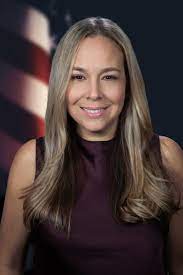
Domonique Cooper: Having lived in Gwinnett County for the past twelve years, I’m passionate about giving back to our community by serving on the school board. My goal is to build a strong, unified team where the school board and community work together.
I’m committed to excellence in Gwinnett County Schools, and I believe my experience can be a valuable asset to our students, staff and stakeholders.
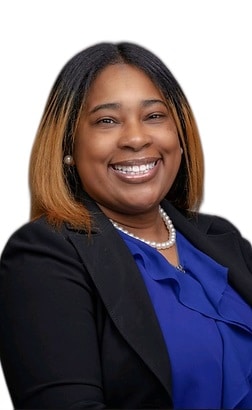
Steve Gasper: I’m running for school board to do what I can to help restore our faith and belief in our public schools and to continue the great work I’ve done so far at GCPS over the past nearly four years.
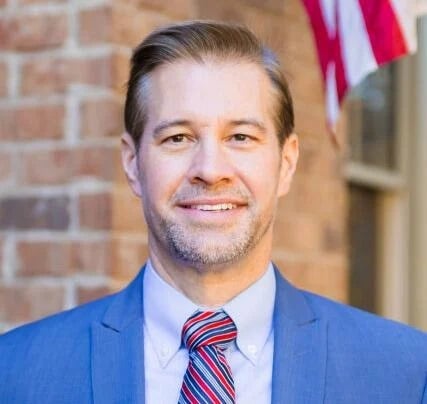
Shana V. White: As a third-generation teacher, I’m running because I believe it is time for an educator with K12 pedagogy experience and instructional knowledge to serve on the board to better meet the changing needs of K12 public schools and classrooms to support the creation of equitable, inclusive, safe and quality learning environments district-wide to meet the diverse needs of Gwinnett County students.
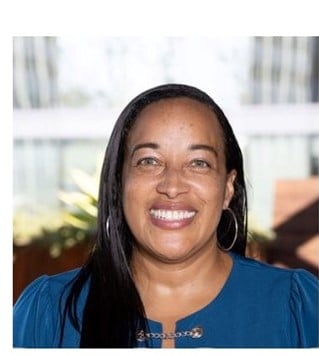
Question #2: Besides a desire to serve and help further the education of local children, what skills, experience, etc., do you bring to the table that makes you qualified?
Yanin Cortes: I am a mother, a former teacher in Gwinnett County Public Schools, and a small business owner.
As a teacher at Shiloh High School, I experienced and witnessed the same concerns and issues that our students, teachers and faculty still encounter every day.
As the owner of three restaurants here in Peachtree Corners and Norcross, I understand the level of hard work and dedication it takes to achieve success. I have learned through serving a diverse workforce and customer base that it is necessary to come together and find common ground to achieve success.
I believe that my experiences as a teacher and a business owner give me a unique, yet valuable skill set tailored to the job of a school board member.
Once elected, I will work to build consensus on the board to ensure that we, as a school board, are a productive and functional governing body that puts the interests of our students and staff first. I will put my breadth of experiences as a GCPS educator, local business owner, and an engaged and concerned parent into every decision I make on the board.
Domonique Cooper: From my time in the Federal Government, I possess expertise in data management, policy planning and fiscal development – skills crucial for navigating school board budgets and ensuring efficient operations.
As a Gwinnett County Public Schools substitute teacher, I honed my classroom management skills, effectively interpreting lesson plans and crafting reports to benefit student progress. This experience gives me invaluable insight into the daily lives of our teachers and students.
My entrepreneurial experience fostered strong communication, salesmanship, and strategic thinking. I can leverage these skills to build relationships with parents, advocate for our schools, and find creative solutions to educational challenges.
Additionally, as an educational strategist, I am a champion for parental involvement, policy improvement, and a more positive educational environment. I am skilled at evaluating achievement gaps and developing strategies to ensure all students thrive.
Steve Gasper: I am a former elementary school teacher who grew up in an education-centered home, as my mother is a retired, 30-year first-grade teacher. I am a graduate of the University of Southern California with a bachelor’s degree in business management and organization.
My wife and I are owners-operators of a vacation rental business and I’ve been a corporate sales and management leader for over 23 years.
I’ve also been intimately involved in GCPS over the past nearly four years, speaking at numerous BOE meetings, meeting with the previous as well as the current Superintendent, meeting and collaborating with senior district leadership, working with several current BOE members to build working relationships, and participating in district committees such as the Instructional Resources Review Committee (IRRC), the Discipline Task Force and the Superintendents Transition Planning Team.
I’ve also collaborated with several State Elected Officials to discuss ways we can create positive education policies for not only Gwinnett County but our entire state.
I’ve been the voice for teachers, parents and our community during this time. I’ve had my “thumb to the pulse” of our community, gaining insight on topics that are most important in real-time.
Shana V. White: I have been a K12 public and private school educator in Georgia for over 15 years.
I have been a varsity basketball coach at The Paideia School, Pace Academy, Peachtree Ridge HS,and Wesleyan School.
At Peachtree Ridge HS and Pace Academy, I was the varsity head coach for a total of 5 years combined. I have been both a classroom teacher and LSTC (local school technology coordinator) in Gwinnett County Public Schools for over 10 years, working at Creekland MS, Peachtree Ridge HS, Summerour MS, and Sweetwater MS.
I currently work with a national philanthropic organization (Kapor Foundation) that supports equitable computer science implementation and resources for K12 public school districts.
Additionally, as a part of my role, I currently directly support Muscogee County Schools (GA), Early County Schools (GA) and Oakland Unified School District (CA) with their computer science implementation as well as lead and facilitate professional development for teachers and school district leaders across the nation in K12 computer science equity, culturally responsible and sustaining computer science, ethical artificial intelligence and computational thinking.
Question #3: Lately, there has been a lot of press about school boards being pressed to eliminate or massage history lessons that may make some students and/or families uncomfortable. What is your reaction to this? And what would you do in similar situations?
Yanin Cortes: I believe that history is a vital component of a well-rounded, world-class education. It is necessary for us to learn from our mistakes and to understand how we got here to prepare our students for the world stage.
That said, the school board should be able to reasonably accommodate those who might find certain materials distressing. We must always take into account maturity and grade level when it comes to all learning materials.
Domonique Cooper: It’s concerning when efforts are made to remove or downplay uncomfortable aspects of history. History, by its very nature, isn’t always rosy.
Sanitizing the past prevents us from learning from mistakes and hinders a complete understanding of the present. Schools have a responsibility to teach history accurately and comprehensively, even the difficult parts.
What I would do:
- Focus on historical context: Uncomfortable events should be presented within the context of the time period. Explain the prevailing social norms, biases, and limitations in understanding of the past. This allows for a more nuanced discussion.
- Multiple perspectives: Show history from the viewpoints of different groups involved. This fosters empathy and critical thinking skills.
- Open discussions: Create safe spaces for students to discuss sensitive topics and grapple with complex issues. Encourage respectful dialogue and guide students towards evidence-based conclusions.
- Acknowledge the discomfort: It’s okay for students to feel uncomfortable with certain historical events. Use that discomfort as a springboard for deeper learning and critical reflection.
- Transparency with parents: School boards should involve parents in discussions about curriculum but emphasize the importance of a complete historical picture. Offer resources and open communication channels for parents who may have concerns.
By teaching a comprehensive and inclusive version of history, we can empower future generations to be informed, engaged citizens who can work towards a more just and equitable society.
Steve Gasper:My feeling is that history is our history and should be told exactly how it was. If we eliminate or massage history lessons, how can we learn and possibly improve upon our past to make us better people in society? I would support teaching history lessons as they are written and not altered.
Shana V. White: In an increasingly polarized climate, a variety of emotions come to the surface for individuals or groups. Any time discussions or topics are polarizing in nature, our first response should be always to listen to understand.
Students and families are stakeholders in our public school system and have the right to be heard at school board meetings. As a teacher, I believed in teaching students the grade-appropriate truth as it relates to the history and current events of the United States as well as the world in a facts-based manner.
As educators our job is to demonstrate respect for all students as full human beings by providing them accurate information from a historic or current context and then give them the time and space to ponder, discuss and interrogate information.
As Dr. Martin Luther King said in an article in 1947, “education must enable one to sift and weigh evidence, to discern the true from the false, the real from the unreal, and the facts from fiction.”
Question #4: In Gwinnett County, students come from diverse socio-economic, racial, and cultural backgrounds. What strategies would you implement to ensure all students have equitable access to educational resources and opportunities?
Yanin Cortes: We need to ensure that we provide all students with a pathway to success and to do this, we must double down on what works.
This starts with early learning and school readiness. The Play 2 Learn initiative, which helps prepare infants through 5-year-olds for kindergarten and beyond, has been a great resource for families in our district.
The results of this program have been a massive success, and I believe that its expansion will benefit all students in our county.
Furthermore, Gwinnett County has received tremendous praise for its successful schools and programs, specifically in areas of STEM and other technical education areas. A safe learning environment goes hand in hand with making quality education possible.
Schools that create a safe learning environment have been more successful in our district. We must ensure the presence of at least two safety resource officers at all times in all of our schools. Further investment in these successful programs and initiatives is key to ensuring that we provide a pathway to success for all students.
Domonique Cooper: Here are some strategies I would use to ensure equitable access to educational resources and opportunities for all students in Gwinnett County’s diverse student body.
Addressing resource disparities:
- Needs-based funding: Allocate resources to schools based on student needs, ensuring schools with higher populations of low-income students have the necessary funding for qualified teachers, updated materials, and smaller class sizes.
- Technology equity: Provide all students with access to high-speed internet and up-to-date devices at school and home. Offer training and technical support to bridge the digital divide.
- Multilingual resources: Ensure textbooks, assignments, and support materials are available in multiple languages to remove language barriers for non-native English speakers.
Supporting diverse learners:
- Culturally responsive teaching: Train teachers in culturally responsive pedagogy to create inclusive classrooms that value diverse perspectives and learning styles.
- Early childhood education: Invest in high-quality early childhood education programs, particularly in underserved communities, to ensure all students enter kindergarten with a strong foundation.
- Targeted academic support: Provide targeted interventions and support programs for students who are struggling academically, including programs for gifted and talented students, ESL learners, and students with disabilities.
Expanding opportunities:
- Advanced Placement (AP) for all: Expand access to AP courses and provide targeted support to help all students, especially those from traditionally underserved backgrounds, qualify and succeed in these rigorous programs.
- Career and technical education (CTE): Ensure all schools offer a variety of CTE programs that expose students to different career paths and provide valuable job skills.
Fostering a culture of equity:
- Data analysis and transparency: Regularly collect and analyze data to identify and address equity gaps in student achievement and access to resources.
- Community partnerships: Collaborate with community organizations to provide wraparound services such as after-school programs, healthcare access, and mental health support.
- Student and parent voice: Actively solicit feedback from students and parents from diverse backgrounds to understand their needs and concerns, and ensure they have a voice in shaping educational decisions.
By implementing these strategies, Gwinnett County can create a more equitable learning environment where all students, regardless of background, have the opportunity to succeed.
Steve Gasper: The diversity of Gwinnett County is what makes this a great county to work and live in, and that should be celebrated. No one should be singled out, excluded or denied access to any educational resources and opportunities. These are our future leaders and need all that we can offer them to be prepared as such.
Shana V. White: Improving educational equity, which meets the needs of diverse racial, cultural, socio-economic and ethnic backgrounds of all, first requires all stakeholders to be on the same page.
We must have hard conversations with students, parents/caregivers, teachers and school/district administration to truly set collective strategies and goals, as educational equity work will look different at each school if it is done correctly.
Broadly, equity in schools should include providing opportunities, access and resources that help all students with diverse needs obtain success. One overall strategy to improve equity in schools involves first assessing the opportunity gaps that exist that are hindering success for all students.
One strategy I used when I was a teacher was making an intentional effort to understand the variety of intersecting identities of our students and how to make the learning environment one where all students and their identities belong.
Additionally, explicitly listening to the voices of students as well as their parents/caretakers and asking them what they need to be successful is an often-overlooked strategy for improving equitable student learning.
Finally, providing teachers with quality training and resources to build equitable learning environments in their classrooms.
Some of those tools include Universal Design for Learning and translanguaging to better meet the needs of students with disabilities and emerging English language learners.
Question #5: Gwinnett County, like almost every other school system, has struggled in the past decade or so to retain personnel — teachers, school bus drivers, etc. Do you have thoughts on how to attract and retain qualified candidates?
Yanin Cortes: We, as a school board, need to project a stable, forward-thinking and forward-planning culture within our school system.
We must utilize the existing support systems in our district to provide support for educators and faculty who are the lifeblood of our district.
As a former teacher, I understand that teachers and staff need support and transparency from administrators and district leaders to feel that they can effectively teach and do their jobs. Teachers need planning time, they need a heads-up when we, as a board, decide to implement a shift in policy.
I know that teachers do not want to bounce from school to school and district to district. Teachers desire a stable and safe teaching environment.
As a school board, we must be there not to micromanage them but to support them. On the school board, I will make it a priority to show our teachers and staff that we are there to support them, not just through words but through our actions as a school board.
Attracting and retaining talented staff is a multidimensional approach. There is a variation of strategies for both aspects.
Domonique Cooper: Attracting personnel, teachers, school bus drivers, etc., is a two-pronged approach.
- Showcase Gwinnett County Public Schools (GCPS) brand: Develop a strong reputation that highlights GCPS company culture, values and unique perks.
- Offer competitive compensation and benefits: Salary and benefits are a major draw. Research what’s competitive in a similar sized district to attract top talent.
- Retaining Qualified Candidates requires a variety of solutions to support stable staffing.
- Prioritize company culture: Create a positive work environment that fosters collaboration, growth and work-life balance.
- Invest in professional development: Offer training programs, mentorship opportunities, and support for employees to develop their skills and advance their careers.
- Recognize and appreciate employees: Make them feel valued for their contributions. Public recognition, rewards programs and promotion from within go a long way.
- Monitor employee engagement: Stay on top of employee sentiment. Conduct surveys and have open communication channels to address concerns and foster a sense of belonging.
By focusing on these aspects, Gwinnett County Public Schools will be able to attract and retain qualified employees and high-caliber candidates by keeping them happy and productive for the foreseeable future.
Steve Gasper: Our district personnel (teachers, administrators, counselors, custodians, cafeteria workers bus drivers, etc.) are the lifeblood of our school system.
Without them, we would cease to exist.
It should be our main focus to make sure they feel happy and fulfilled in their jobs. Over the past several years, GCPS has lost many great administrators, teachers, and those who support them.
We need to provide a safe, welcoming, and supportive environment for them by creating effective staff retention programs (competitive pay, benefits, growth opportunities and support services).
We must work to remove any roadblocks that prevent them from being successful. This is one of the areas that is extremely important to me and will be a main focus for me when elected.
Shana V. White:Teaching as a profession nationally is undervalued and under respected. One of the things I would like to see improved as a former classroom teacher in Gwinnett is the quality of school site-based leadership.
School site leadership must clearly understand the school’s culture and climate is largely based on how teacher, staff and students are treated daily in the building daily. All school district leadership must better equip school site leaders with the training, resources and decision-making ability to make their schools a place where all teachers can thrive.
Making intentional efforts by school administrators to support teachers with duty-free planning, increased agency in their classroom, supporting all diverse learners’ needs in the building, making collective decisions on school policy and implementation, collaborative lesson/unit planning time, as well as uplifting teachers on a regular basis, are all items that would really go a long way in retaining teachers and making them feel valued.
As it relates to other school personnel, similar ideals of making them feel valued and an important part of the success of a school system is key. One way to value other educational personnel (bus drivers, office staff custodians, etc.) includes having leadership in place with clear and consistent expectations that are communicated.
Additionally, humanizing the work environment as much as possible and having personnel leadership open to feedback and ideas from staff go a long way to validating employees.
Related
Arlinda Smith Broady is part of the Boomerang Generation of Blacks that moved back to the South after their ancestors moved North. With approximately three decades of journalism experience (she doesn't look it), she's worked in tiny, minority-based newsrooms to major metropolitans. At every endeavor she brings professionalism, passion, pluck, and the desire to spread the news to the people.

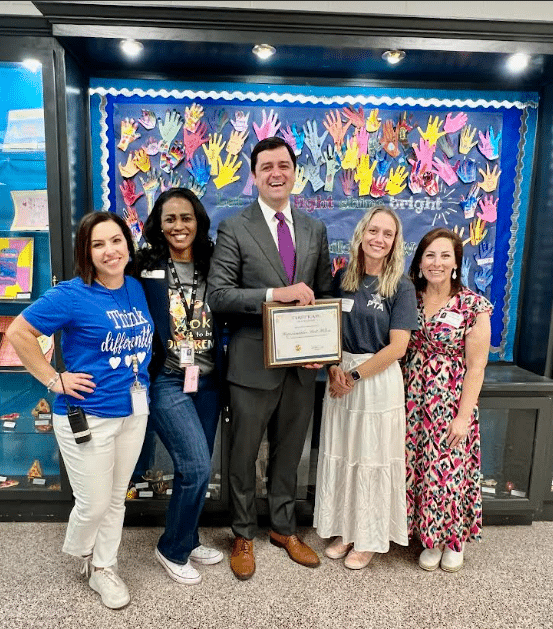
Simpson Elementary School celebrated Exceptional Children’s Week (ECW) last month with five days of special activities to recognize their special needs population and all of their exceptional students.
April 14–18 is set aside each year to celebrate children with disabilities, gifts and talents. This year’s ECW theme was Bridging Gaps and Building Futures, and the school was happy to take part.
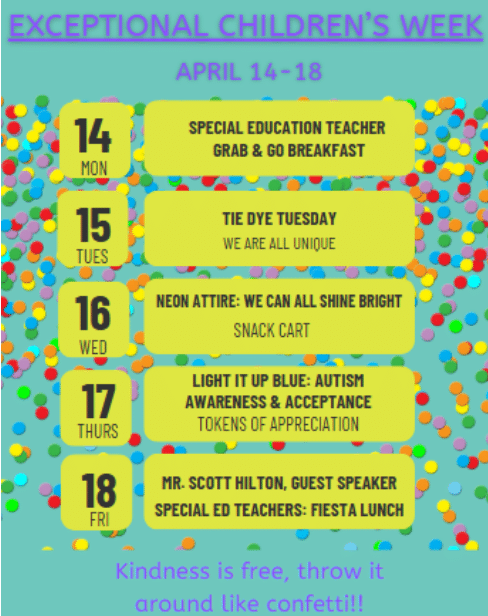

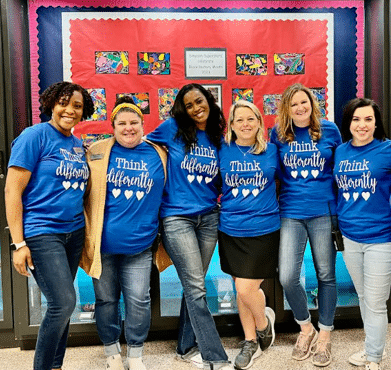
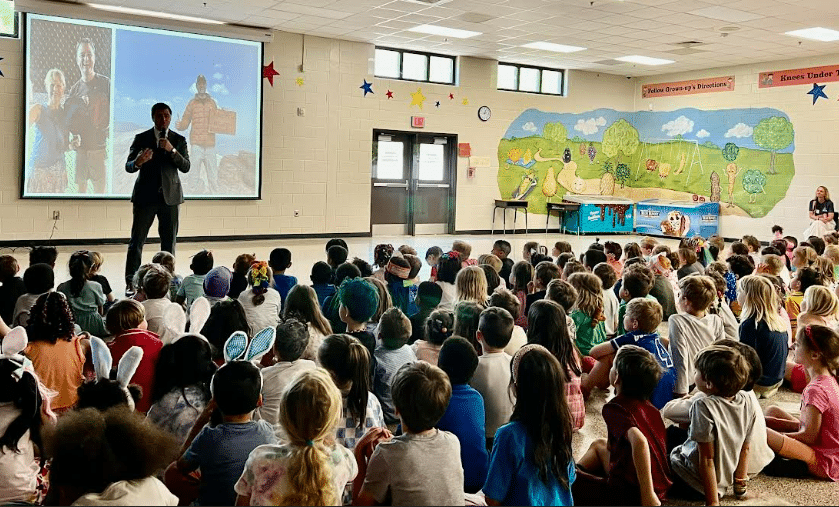
They highlighted each day of the week on the morning news with fun facts about notable people in society — and throughout history — who have overcome challenges with their disabilities, including actor Daniel Radcliffe (who has lived with dyspraxia for his entire life), Tom Cruise, Whoopi Goldberg, Frida Kahlo and Helen Keller.
Simpson Elementary’s technology team also pre-recorded various special needs classes reciting the Pledge of Allegiance every day of the week.
Guest speaker
To end their ECW with a bang, they invited former Simpson Elementary parent, State Representative Scott Hilton, to come in and speak to their K-2 classes about raising his son, Chase (who is autistic and now a student at Norcross High School), and how being different is okay.
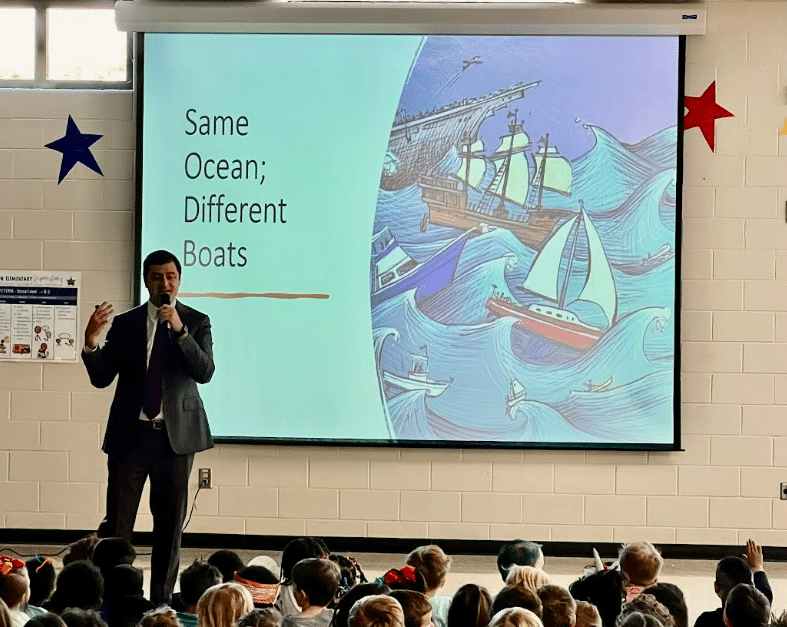
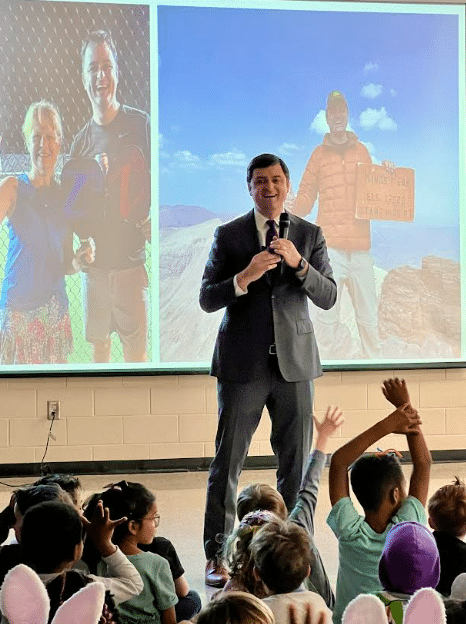
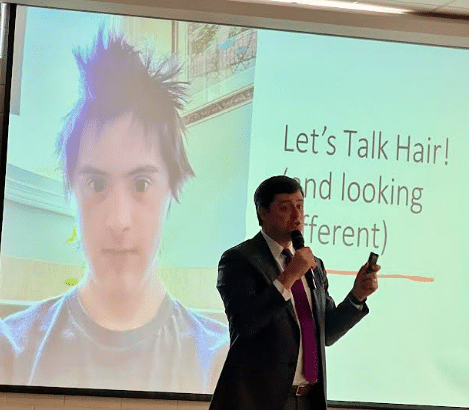
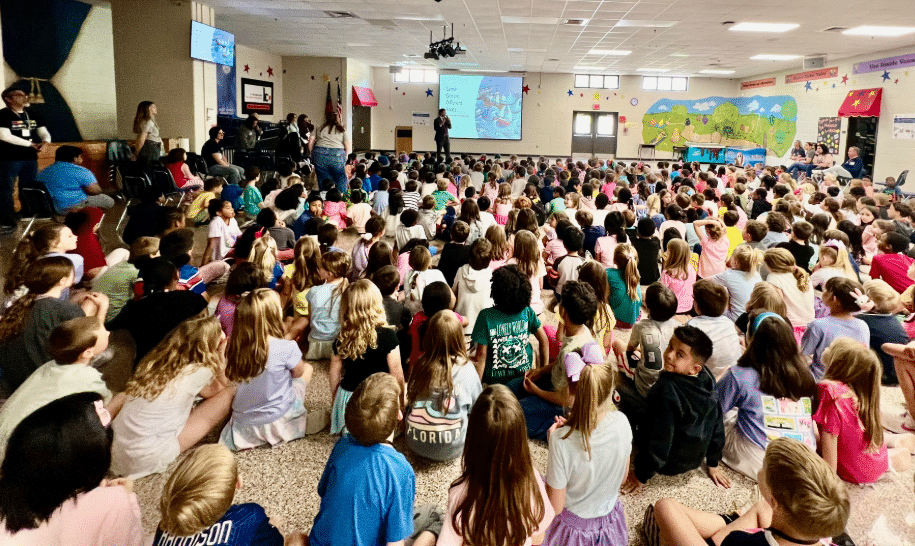
“Showing kindness and being inclusive is the best version of humanity,” said Dr. Taffeta Connery, Simpson Elementary School principal, in a statement about the event.
“Simpson Elementary has a special needs population of 214 (23%) of 946 students. [And] … we strive to ensure that our students are valued, recognized and instilled with high expectations for all.”
For more about Simpson Elementary, visit simpsones.gcpsk12.org.
Related
Education
Paul Duke STEM High School Student Earns CGO Scholarship
Published
7 days agoon
May 2, 2025
Cobb Global Outreach Inc. (CGO Inc.), a non-profit organization dedicated to enhancing financial literacy and educational opportunities, recently awarded three scholarships to metro Atlanta high school seniors, including one to Paul Duke STEM student, Baylor M. Brown.
The scholarship initiative underscores CGO Inc.’s commitment to empowering youth through financial education and support.
According to CGO’s social media pages, these outstanding students have shown incredible dedication and resilience in their academic journeys. “We are proud to support their continued success and look forward to seeing all that they will achieve!”
Scholarship details and impact
The scholarships provided by CGO Inc. are designed to alleviate financial barriers and encourage academic excellence among students pursuing higher education. Each scholarship recipient will receive financial assistance to support their educational endeavors, along with resources to enhance their understanding of financial management and literacy.
The scholarship recipients have demonstrated remarkable potential and a strong commitment to making a positive impact in their local community and beyond.
Bobby Cobb, CEO and founder of Cobb Global Outreach Inc., expressed enthusiasm about the partnership, stating, “We are honored to support the students … . By investing in their education and financial literacy, we aim to equip them with the skills necessary for a successful and financially secure future.”
Looking ahead
Cobb Global Outreach Inc. remains committed to expanding its scholarship programs and financial literacy initiatives. The organization plans to collaborate with additional schools and community partners to further its mission of closing the wealth gap and fostering economic empowerment among youth.
About Cobb Global Outreach Inc.
Founded in January 2021, Cobb Global Outreach Inc. is dedicated to educating middle and high school students about financial literacy. The organization believes that providing students with tools and resources related to financial literacy will help narrow the wealth gap and promote economic empowerment.
For more information, visit cobbglobaloutreachinc.com.
Related
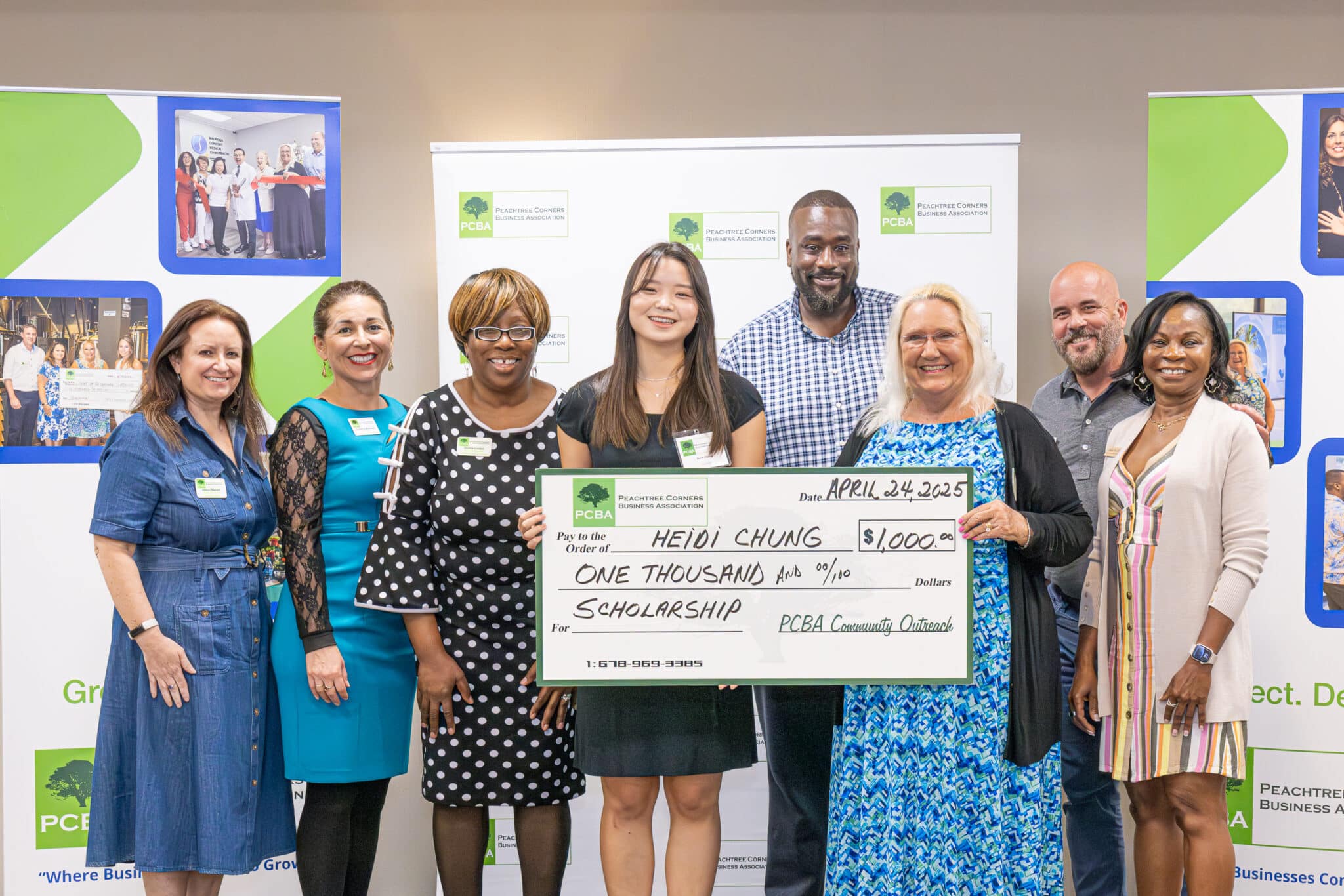
The Peachtree Corners Business Association (PCBA) awarded local high school senior, Heidi Chung, a $1,000 scholarship during their April 24 Business After Hours event. Heidi and her family were presented with the scholarship and introduced to the organization’s members and guests at the monthly gathering.
Heidi was accepted by several colleges and has selected the University of Kentucky to continue her education, pursuing a degree in nursing. When asked what lessons she has learned from her experiences volunteering and serving in the community throughout her life, Heidi commented, “I have learned that true leadership is about service, taking initiative and persevering through challenges.”
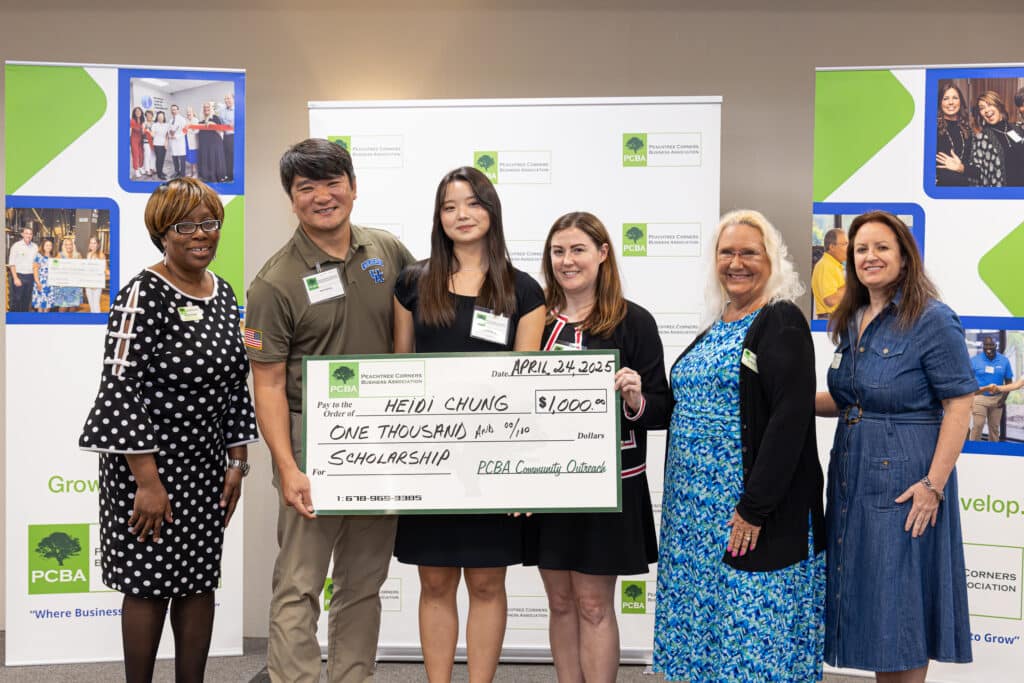
Scholarship Chair Donna Linden and Outreach Director Suzanna Martinez shared that the scholarship committee was impressed with Heidi’s many accomplishments, “whether she was organizing fundraisers, leading performance groups or helping athletes recover from injuries, Heidi demonstrated a positive impact on the community, as well as outstanding academic results.”
Funds for the PCBA Community Outreach Program are raised throughout the year from PCBA membership, sponsorship and an annual charity event. Donations and scholarships are awarded at PCBA’s monthly events so that members have the opportunity to learn more about the individuals and organizations.
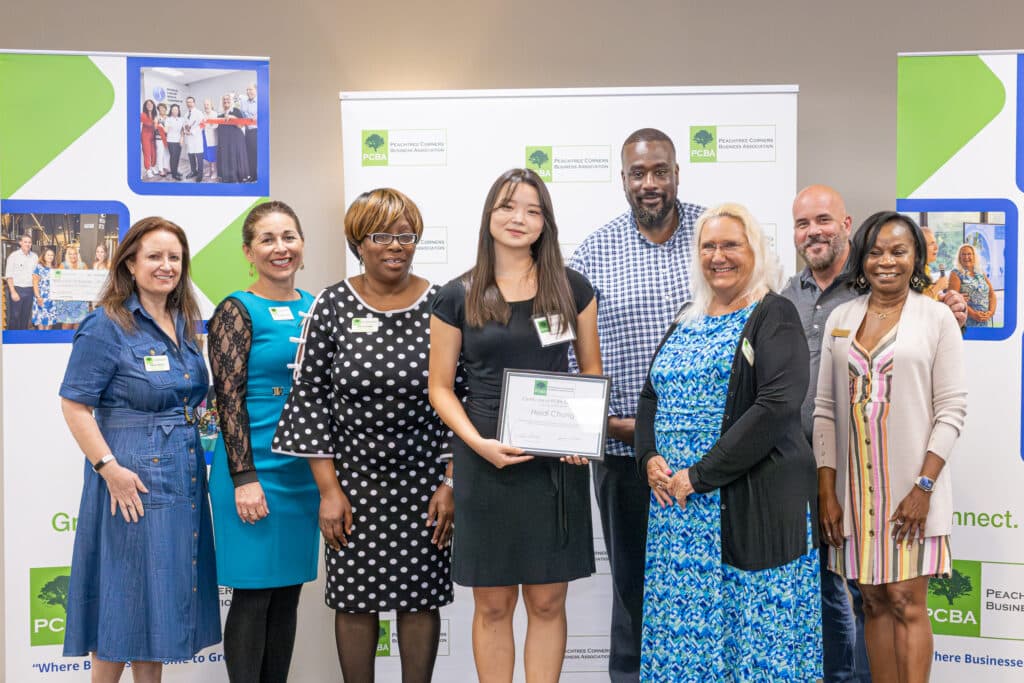
“We are so proud that the PCBA has … awarded 20 scholarships to outstanding future business leaders and donated in excess of $173,000 into our metro Atlanta community over the last 13 years,” stated Lisa Proctor, PCBA board president.
About Peachtree Corners Business Association
“Where Businesses Come to Grow,” the Peachtree Corners Business Association is a business membership organization that focuses on innovative approaches, programs, shared resources, community outreach and opportunities for member businesses and professionals to connect, develop, grow and prosper.
The PCBA is made up of businesses of all sizes and types who want to expand their reach and grow their business within Peachtree Corners and the greater metro Atlanta area.
For more information, call 678-969-3385, email membership@peachtreecornersba.com or visit peachtreecornersba.com.
Related
Read the Digital Edition
Subscribe
Keep Up With Peachtree Corners News
Join our mailing list to receive the latest news and updates from our team.
You have Successfully Subscribed!

GA Tech Launches First-of-its-Kind GT Atrium in Peachtree Corners

Katherine Lafourcade — A Journey of Passion, Resilience and Giving Back

Digital Edition

PCBA Announces 2025 Scholarship Winner

Paul Duke STEM High School Student Earns CGO Scholarship

World Blood Donor Day Starts Here: Theo’s Miracle, Katherine’s Mission [Podcast]

Peachtree Corners Grows Business Opportunities Through Economic Development

Executive Function: A Tribute to Working Moms

Simpson Elementary Marks Exceptional Children’s Week

Executive Function: A Tribute to Working Moms

Official City Merchandise Line Debuts This Saturday at Town Green

Peachtree Corners Grows Business Opportunities Through Economic Development

Digital Edition

World Blood Donor Day Starts Here: Theo’s Miracle, Katherine’s Mission [Podcast]

Paul Duke STEM High School Student Earns CGO Scholarship

PCBA Announces 2025 Scholarship Winner

Light up the Corners [Video]

Capitalist Sage: Business Leadership in Your Community [Podcast]

Cliff Bramble: A Culinary Adventure through Italy

Top 10 Brunch Places in Gwinnett County

A Hunger for Hospitality

THE CORNERS EPISODE 3 – BLAXICAN PART 1

Top 10 Indoor Things To Do This Winter

The ED Hour: What it takes to Remove Barriers from Education

Peachtree Corners Life
Topics and Categories
Trending
-
Digital Edition4 days ago
Digital Edition
-
Podcast4 days ago
World Blood Donor Day Starts Here: Theo’s Miracle, Katherine’s Mission [Podcast]
-
Business2 days ago
Peachtree Corners Grows Business Opportunities Through Economic Development
-
Community2 days ago
Executive Function: A Tribute to Working Moms








